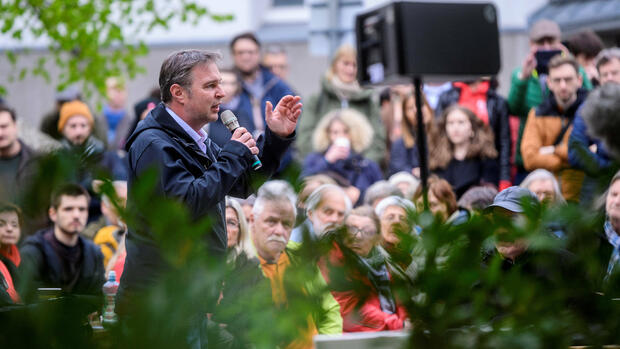Vienna It sounds tempting what Andreas Babler has in store for the Austrians if he becomes the head of the Social Democrats (SPÖ) and eventually even chancellor. He promises a 32-hour week instead of the 40-hour week, and that without cuts in wages.
Work less, but have more time for family and hobbies – the mayor of the industrial city of Traiskirchen wants to emerge as the winner of the SPÖ member survey that has been running since Monday.
Around 148,000 party members can vote until May 10 on who should lead the Social Democrats in the future. These are crucial weeks for the SPÖ. Because the questioning only takes place because there is a personnel dispute in the party, which is actually a war of direction. How should the SPÖ position itself in a country in which the majority of the voting population is doing well and the provision is comprehensive?
In addition to Babler, two other politicians want to lead the SPÖ in the parliamentary elections, which will take place in autumn 2024 at the latest. They are symbolic of the ideological directions of social democracy.
The current chairwoman Pamela Rendi-Wagner belongs to the left-wing wing, which is why critics like to label the epidemiologist as a salon socialist. Hans Peter Doskozil, the governor of Burgenland, has taken a more right-wing position on security issues as a former police director, but he pursues left-wing concerns when it comes to socio-political issues.
In Burgenland, for example, he introduced a minimum wage of 2000 euros net, which is a rather high amount for Austria. There has been a dispute between Doskozils and Rendi-Wagner for years. Now Doskozil wants to overthrow the chairman.
Babler, on the other hand, comes across as a part authentic, part naïve do-gooder. He wants to reignite the fire in the SPÖ. “The protest movement is in our DNA,” he says.
In this area, however, the SPÖ received competition at the weekend. In the elections in the state of Salzburg, the Communist Party (KPÖ) won 11.7 percent of the votes, and in the capital Salzburg they achieved more than 21 percent.
Previously, it had a share of about 0.4 percent. Former voters of the SPÖ and the Greens are responsible for around half of the gain. Above all, she is concerned about one thing: the high real estate prices and rents in the country. The strengthening of a left-wing force in Salzburg is proof of how urgently the SPÖ needs to resolve its conflict.
Could the SPÖ find partners?
Whoever emerges from the race as the winner – the question will be whether the new president will inspire so many Austrians that the SPÖ can form a government with a partner or in a coalition of three.
According to polls, the party would get about a quarter of the votes.
(Photo: dpa)
There are reservations about all three candidates. The SPÖ will probably only get more than the current 25 percent of voters if it succeeds in addressing voters on the right of the center or those who voted for the right-wing populist FPÖ.
In polls, the Freedom Party has a share of the vote of around 30 percent. High inflation, the aftermath of the pandemic and immigration have fueled discontent in the country. According to pollsters, the SPÖ is currently supported by around a quarter of voters and is on par with the conservative Chancellor’s Party ÖVP.
The 50-year-old Babler says that people who are “hated” by the establishment should vote for the SPÖ instead of the FPÖ. “A healthy lunch for every child”, price limits for rent or free electricity up to 60 percent of average consumption: the politician wants to attract voters with such bold demands.
These points are important to politicians
Babler deters business-friendly voters. Especially since he pushes aside objections to his proposal to reduce working hours. “Everything is affordable,” he says. In order to cushion the consequences of the corona pandemic, the state finally distributed 47 billion euros with the watering can.
>> Read here: Where the Germans prefer to go on vacation
Doskozil’s policy is also rather expensive. Whether housing, care, transport or childcare – he initiated state solutions for many issues in Burgenland. Critics say he is crowding out private providers.
The governor replies that the state can offer a better service than private investors and prevent them from making big money with public services.
Programmatically, Rendi-Wagner has a difficult time in this area of conflict because it is less populist. She advocates modern left concerns such as all-day schools or an energy transition fund; however, their program is less comprehensively nurturing than the programs of Doskozil and Babler.
Disputes are also possible after member surveys
In the SPÖ, one hopes that the member survey will end the dispute over direction and that the losers will accept the result. “Our party is in a critical situation,” says the 34-year-old head of the Lower Austrian party branch, Sven Hergovich.
Everyone is now waiting eagerly to see if the liberation will succeed. The result of the member survey is not binding, but is only intended to convey an impression of the mood. Finally, the party conference on June 3rd will elect the new president.
The disputes in the party could therefore continue, especially if the poll does not produce a clear winner. It is important to draw a bow across the different currents in the SPÖ, Doskozil said on the ORF at the weekend. “We’ll see if that succeeds.”
More: Austria’s central bank chief – “Must continue the path of interest rate hikes”
